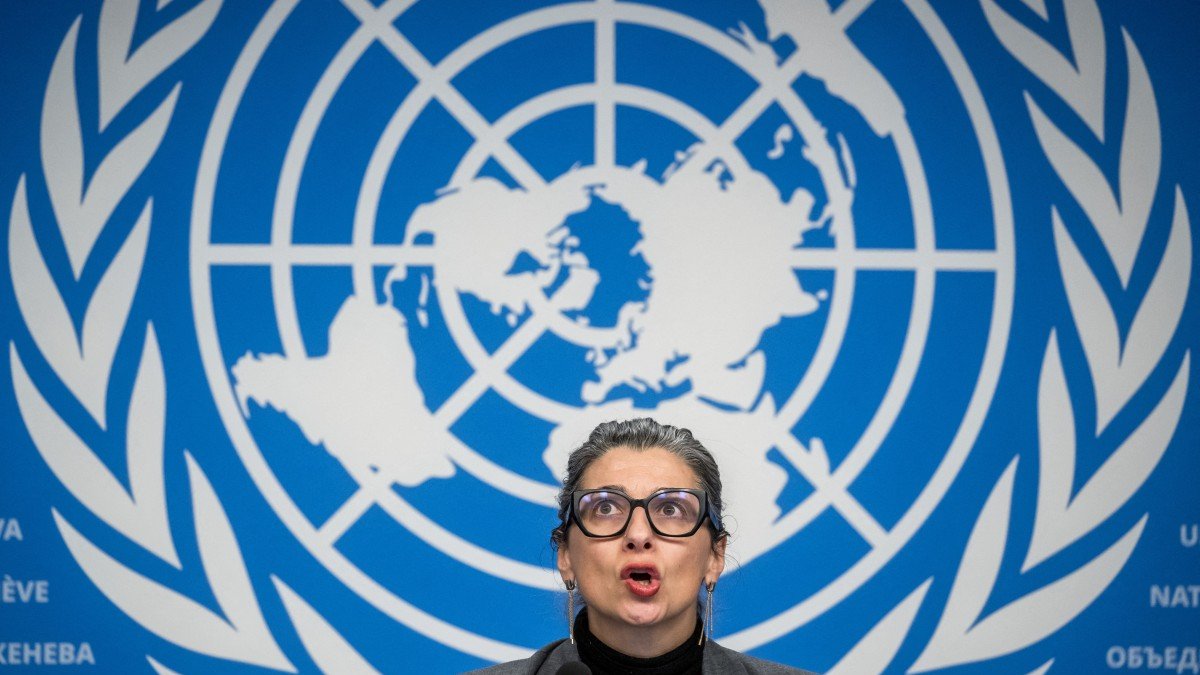UN official employs word salads in defending anti-Jewish, anti-Israel vitriol
Challenged by a Norwegian journalist, Francesca Albanese says “you can make up your own definition” of antisemitism.

U.N. special rapporteur for Palestinian rights, Francesca Albanese in Geneva on December 11, 2024.
A Norwegian journalist appeared to surprise a controversial U.N. official, starting a television interview by asking if the anti-Israel bulldog is an antisemite.
Francesca Albanese, the U.N. special rapporteur for Palestinian rights, has been accused by the American, French and German governments of antisemitism, and is known for her relentless criticism of Israel and utilizing Jewish tropes in her rhetoric.
Journalist Yama Wolasmal of NRK, Norway’s national public broadcasting station, immediately posited the question of Albanese’s antisemitism to her in an interview this past week, eliciting an audible sight and eye roll, which Albanese typically employs when confronted with the allegation.
She never directly answers the question, instead chiding Wolasmal.
“As a human being, as a mother, as a lawyer, this is not the way I would like to start an interview with you,” Albanese said.
She claimed that her critics are reflexively pro-Israel, labeling them as “sycophants and the squads of minions and barking dogs,” adding that “everywhere there is a network that protects Israel.”
Albanese insisted that her conclusions “wouldn’t change if Israel was ruled by Buddhists, Muslims, Christians,” calling allegations of Jewish bias “a deflection tactic to move the attention away from the violation that Israel commits.”
Wolasmal also took Albanese to task for her endorsement of a tweet comparing Israeli Prime Minister Benjamin Netanyahu to Nazi leader Adolf Hitler.
“This is precisely what I was thinking today,” Albaense wrote in July 2024 in response to a post by another Israel-focused former U.N. official, who depicted adjoining pictures of Hitler and Netanyahu surrounded by supporters, with Netanyahu’s depiction coming from an address to Congress.
Albanese attempted to explain in the NRK interview that she was comparing the “cheering crowds” around Hitler and Netanyahu, rather than the leaders themselves, adding: “I did not compare a Nazi leader to a genocidaire, the architect of the genocide of the Palestinians in Gaza.”
Even with that, Albanese said a comparison between Hitler and Netanyahu would not be antisemitic.
“Antisemitism is discrimination against the Jewish people as Jews,” Albanese said. While acknowledging such a comparison “might be inopportune, it might lack diplomacy,” according to Albanese, “you can make up your own definition” of antisemitism.
The International Holocaust Remembrance Alliance’s (IHRA) working definition of antisemitism, which is the most commonly accepted definition across the globe, states that “drawing comparisons of contemporary Israeli policy to that of the Nazis” is antisemitic.
Called a particular question ‘a tricky one’
Confronted with the disproportionate number of U.N. resolutions criticizing Israel—compared with those cast against states widely recognized as human-rights abusers—Albanese said the global body “displays some bias” against Israel but framed it as a byproduct of the U.N.’s overall ineffectiveness in punishing Israel.
“The overproduction of resolutions is due to the fact that nothing changes on the ground,” Albanese countered. “This is a consequence and a dysfunction of the lack of effectiveness of the Security Council” when it comes to the Palestinian issue.
“Because the Security Council has often been paralyzed by the U.S. veto, then you have these more democratic instances where there is no veto, like the Human Rights Council and the General Assembly,” Albanese said of the bodies from where regular anti-Israel, non-binding resolutions typically permeate. “There is never enforcement of international law when it comes to Israel.”
Albanese stammered through an answer to Wolasmal’s inquiry as to how Israel should attack Hamas, given the terror group’s methods of operating within civilian areas.
Calling the question “a tricky one,” Albanese insisted that she is “the first one to say that Hamas should be held accountable for the crimes committed” before adding “first and foremost against the Palestinians.”
Albanese’s reaction to the Hamas-led slaughter of 1,200 people in southern Israel on Oct. 7, 2023, though, was to condemn attacks on civilians (“whoever launches them”) and then to assert that the massacre “must be put in context” of “almost six decades of hostile military rule over an entire civilian population.”
Albanese was recently disinvited from appearing in front of the Dutch parliament as a result of her anti-Israel vitriol and has been accused by critics of supporting terror organizations and calling for an end to Israel. According to Deborah Lipstadt, the U.S. State Department’s former special envoy on antisemitism, Albanese was labeled a “horrible person” by U.N. Secretary-General António Guterres, himself not viewed as friendly to Israel.

























